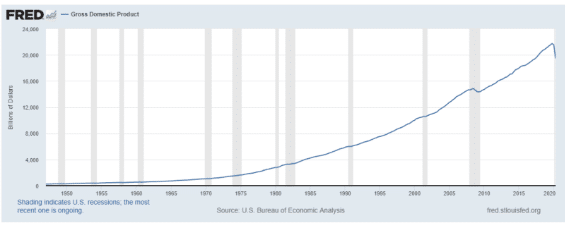One of the primary arguments for Commercial Real Estate as part of a broadly diversified portfolio of risk assets is that its price movements tend to be more stable and less correlated to other asset classes such as publicly traded stocks and bonds. While this relative price stability may seem like a drag on portfolio performance during periods of intense growth, it can also be an anchor in times of economic contraction. To make the case for why, it is first necessary to understand economic cyclicality.
Recessions Are Guaranteed
According to the National Bureau of Economic Research, a recession is defined as “a significant decline in economic activity spread across the economy, lasting more than a few months, normally visible in real Gross Domestic Product, real income, employment, industrial production, and wholesale-retail sales.” Historically, the United States has experienced a recession every 10-20 years and they tend to be relatively brief. Following the recession, the economy tends to enter another expansion cycle, as demonstrated in the graph below from the St. Louis Federal Reserve (NOTE: The shaded areas indicate recessionary periods):

The Case for Commercial Real Estate
In Commercial Real Estate, the primary recessionary risk is that a sales decline in tenant businesses results in them not being able to pay their rent. Historically, businesses that are tied to discretionary spending like clothing, restaurants, and entertainment tend to fare worse in recessionary periods because consumers tend to reduce spending in these areas to focus on the essentials. As a byproduct, businesses that serve essential needs like drug stores, grocery stores, banks, and hospitals as well as businesses that meet a housing need like multifamily apartments or hardware stores tend to be more resilient during recessionary periods.
So, our case for owning commercial real estate through all phases of the economic cycle is a relatively simple one. Property that is leased to “essential” businesses can provide an investment portfolio with some level of “defensive” protection when an inevitable recession occurs. These essential businesses tend to suffer less during the recession and rebound faster when the next expansion cycle begins. As a result, there is less risk that a tenant will default on their rent payments, which ensures that the property can continue operating smoothly.
How This Drives Our Investment Strategy
Our belief in the resilience of commercial real estate assets drives one major component of our investment strategy. We prefer properties that contain essential businesses in high growth markets that have high traffic locations. Tactically, this means that we actively seek out grocery store anchored shopping centers, lifestyle businesses like gyms, or other retail centers that contain hardware stores, convenience stores, and/or gas stations. Our belief, informed by history, is that these businesses will fare relatively well during an economic contraction and provide a high degree of stability during expansions.
This strategy is exemplified on the Properties page of our website where a sample of our portfolio is listed. For example, we have invested in:
- Kimberly Crossing: A 90,000 SF retail center anchored by a Fresh Thyme Farmers Market, Planet Fitness gym, and Dollar General store.
- Vineland Retail Center: A 40,000 SF shopping center anchored by a CVS drug store
- Acme Commons: A 84,000 SF shopping center anchored by an Acme grocery store, Verizon Wireless, and a Starbucks.
This investment strategy has proven to be successful through multiple contractions to date and we expect that it will continue to perform similarly in the future.
Interested in Learning More?
First National Realty Partners is one of the country’s leading private equity commercial real estate investment firms. We leverage our decades of expertise and our available liquidity to find world-class, multi-tenanted assets below intrinsic value. In doing so, we seek to create superior long-term, risk-adjusted returns for our investors while creating strong economic assets for the communities we invest in.
If you are an Accredited Investor and would like to learn more about our investment opportunities, contact us at (800) 605-4966 or ir@fnrpusa.com for more information.


